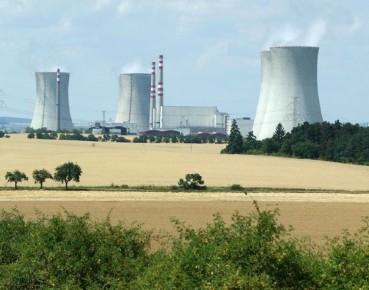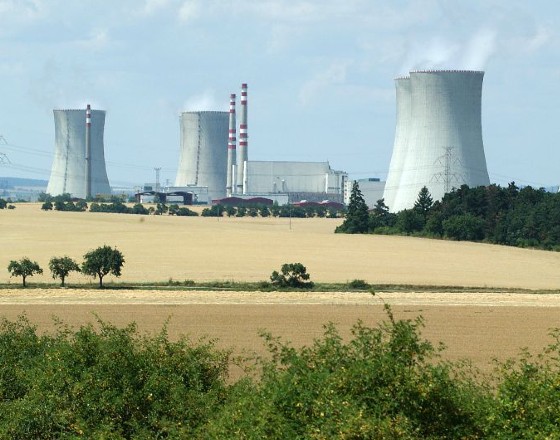Tydzień w gospodarce
Category: Trendy gospodarcze

Dukovany NPP, Czech Republic (CEZ Group, Public domain)
The ČEZ Group, a state-owned energy holding company, and the largest company in Central and Southeast Europe (CSE) in terms of market capitalization, is selling its assets in Romania. The Romanian assets, comprised of seven companies, will be sold to funds managed by Macquarie Infrastructure and Real Assets, the Czech company announced in later October.
In the statement, the Czech energy conglomerate said that the sale of its Romanian assets is part of the company’s new strategy to divest chosen assets in certain countries. “By selling Romanian assets, ČEZ will increase its debt capacity and will be able to channel resources into investments in line with the current strategy, which is focused on decarbonizing the production portfolio, developing renewable energy and providing modern energy services in the Czech Republic and across Europe,” the press release reads.
ČEZ is the largest utility and biggest publicly traded company in the Czech Republic. The majority shareholder of the company is the Czech government, holding around 70 per cent of the shares. The rest of the shares is divided among various institutional and individual shareholders. The company entered the Romanian energy market in 2005 when it bought the distribution company operating in Romania’s south, Electrica Oltenia, covering 86,665 km.
However, in May last year, the Czech energy giant announced a change in its longterm strategy that has been based on building a strong portfolio of energy companies in the CSE. The energy holding had been focusing on foreign expansion and the acquisition of energy assets in countries such as Romania, Bulgaria, Poland, or Turkey since early 2000s. Last year, the company decided that it would focus now more on the modernization of the Czech energy market and investment in renewable energy producers in central and western Europe.
In June this year, the state-controlled Czech energy holding announced its new business strategy. In the presentation, ČEZ said that it will focus more on markets in Central and Western Europe, mainly in the Czech Republic, but also in Germany, Poland, France and Slovakia. It wants to keep companies that are active in modern energy services (ESCO) both at home and abroad. On the other hand, it said that it would gradually divest in its assets in Romania, Bulgaria, Turkey, and Poland (coal assets).
The sale of the Romanian assets is the first sign of the implementation of the strategy. But besides the Romanian portfolio, ČEZ also started the divestment process for its five Polish companies in September this year. According to the Prague Business Journal, they include the Skawina and Chorzow coal-fired power plants. ČEZ is also considering selling the companies CEZ Produkty Energetyczne Polska and CEZ Polska.
The situation in Bulgaria is more complicated. Last November, ČEZ and the Bulgarian company Eurohold each filed an administrative lawsuit against the Bulgarian Antimonopoly Office‘s decision, which blocked the sale of ČEZ’s local assets to Eurohold in October 2020. In July this year, the Administrative Court annulled the Office’s decision. At the end of August, the Antimonopoly Office began to re-examine ČEZ’s intention, which ČEZ welcomed, the Prague Business Journal informed.
Other key goals of Czech energy conglomerate spelled out in the June strategy are: strengthening the Czech nuclear security, decarbonization of generation portfolio, development of renewables and energy services (ESCO) and achieving significant positions in markets close to the Czech Republic, primarily Germany, northern Italy and Poland.
It is certainly no coincidence that the energy strategy of the largest energy provider in the country largely copies the national energy strategy of the Czech Republic published last year. Like ČEZ, the Czech government in its energy strategy focuses mainly on decarbonization, energy security, and energy efficiency.
Although there is an emphasize on renewable energy sources, the Czech government has always viewed the use nuclear power as the safest and most efficient way to transfer from fossil fuels to renewables. It has also spent a considerable amount of money on developing the country’s nuclear energy facilities. Experts argue that one of the main reasons the Czech energy giant ČEZ is selling its foreign assets now is the need to finance the construction of new nuclear reactors at home.
When asked about how ČEZ is going to reinvest the money it receives from the planned sale of foreign assets, the company’s CEO Daniel Benes said that the energy holding aims to reinvest the money primarily in the Czech Republic. “We will be investing in all segments of the industry, but nuclear power development is definitely a very important part of it,” he told Hospodářské Noviny, a Czech business daily.
The most widely discussed energy project in the Czech Republic is the planned expansion of the Dukovany nuclear power plant. The NPP, located in the south-east of the country, was constructed between 1985 and 1987. All four power unites with pressurized water reactors are still in operation. The plant is owned and operated by ČEZ.
In July this year, the Czech government signed a series of agreements with ČEZ for the expansion of the Dukovany NPP. The final price of the new unit is still unknown as it depends on the result of the planned action, but cost estimates range between the USD5.9bn and the USD6.9bn.
ČEZ is now preparing a tender for the construction. The Czech government agreed to provide interest-free loan for the new unit. The supplier should be selected and ready to sign the contract by the end of 2022. A spokesman for CEZ confirmed that the company had consulted with potential tenderers, and they all confirmed their interest. These include China’s CGN, France’s EDF, South Korea’s KEPCO, Russia’s Rosatom and US-based Westinghouse. But, according to Reuters, the tender may face delays after security services and opposition parties raised concerns about the possible participation of bidders from China and Russia, officials said.
The Czech Republic was one of the key drivers behind the motion to recognize nuclear power as a “transition” source of energy by the European Union. It has long been opposed by Europe’s German speaking countries, namely Germany, Austria and Luxembourg. Particularly Germany has been strongly against the motion as it has been working on nuclear reduction for many years.
Earlier this year, with the support of one of the two EU’s key member states, France, the Czech Republic, Hungary and Slovakia managed to convince the rest of the bloc of the need to include nuclear power in the “green energy mix”.
Nuclear energy is particularly important for the CSE. According to World Nuclear Association’s database, there are currently 448 “operable civil nuclear power nuclear reactors around the world, with further 53 under construction.” Nearly 10 per cent of those reactors (41) are located in the CSE. Ukraine tops the list with 21 reactors, followed by Slovakia (9), Bulgaria (6) and the Czech Republic (6).


